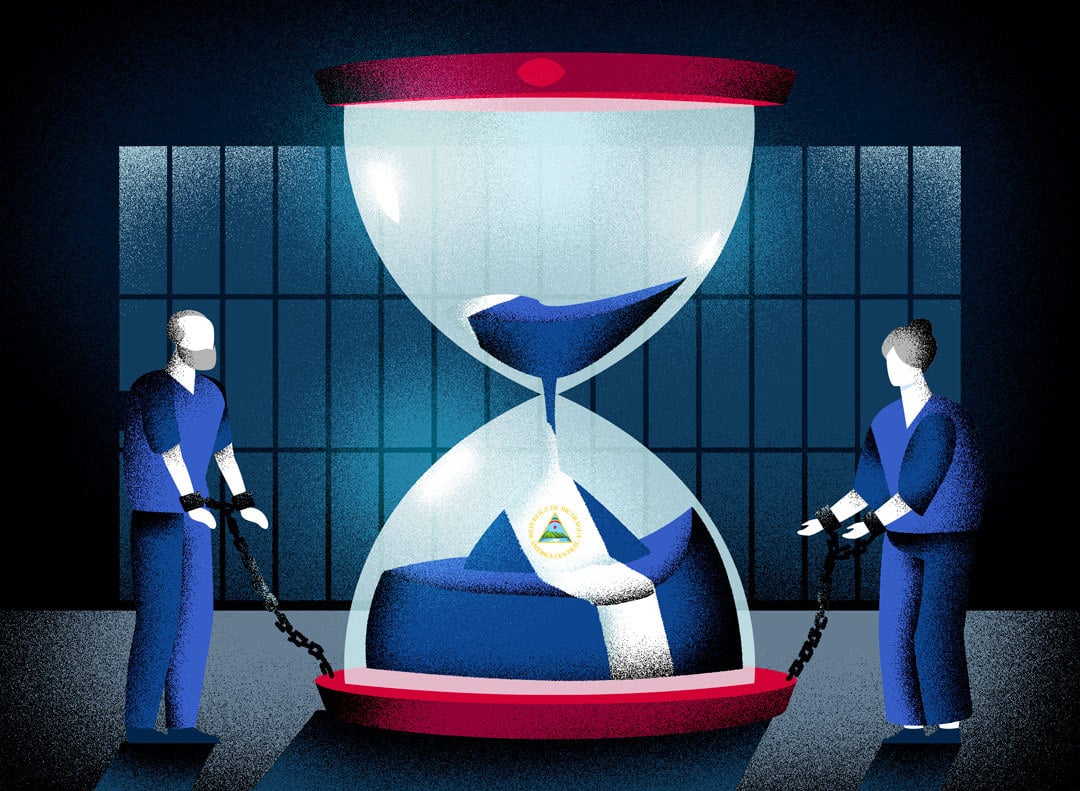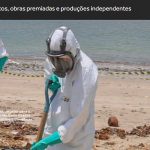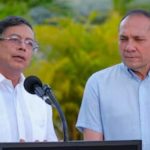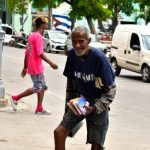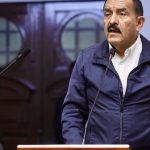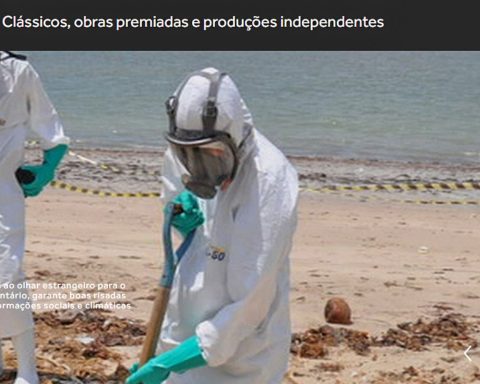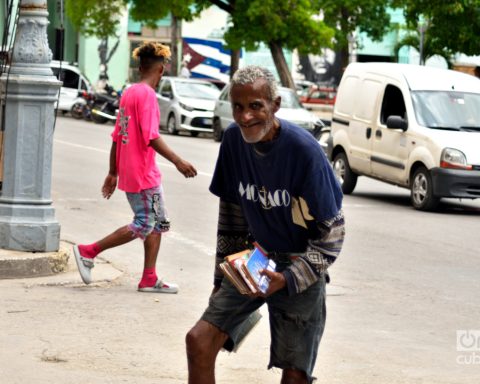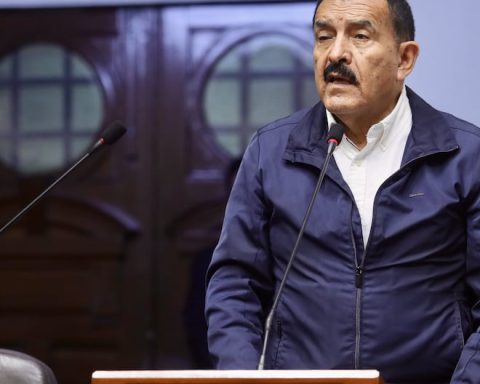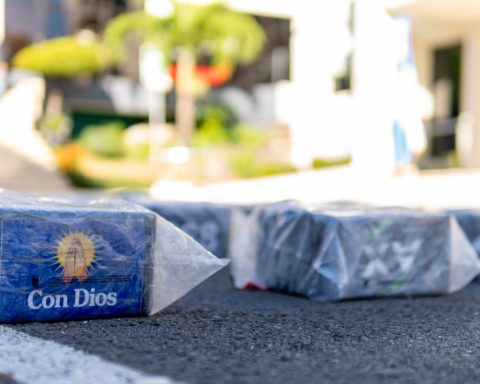Wilfredo Balmaceda has been in prison for seven years. Since 2014, he has been imprisoned and is considered by human rights organizations to be one of the first political prisoners of the regime of Daniel Ortega and Rosario Murillo. Since 2021 he became, according to Nicaraguan law, an older adult. But he is still locked up in La Modelo, subjected to mistreatment and incommunicado with his nine-year-old son.
Being over 60 years of age does not exempt you from criminal liability. However, in many of these cases the judges choose to order house for jail. Article 176 of the Criminal Procedure Code (CPP), in subsection 3, indicates that “the judge can substitute preventive home detention, among other cases, for valetudinary persons or those affected by a duly proven terminal illness.”
However, the Ortega-Murillo regime is holding 21 older adults hostage, 17 of them arrested in the months prior to the November 2021 vote, when Ortega was re-elected in a vote without democratic guarantees, eliminating political competition by order the arrest of the main political, economic and social leaders.
For the criminal lawyer and former departmental prosecutor of the Public Ministry, Boanerge Fornos, the refusal to apply countless benefits that protect older adults, shows that “we are in the presence of measures taken by the courts, not discretionally, but arbitrarily.”
Fornos affirms that one of the first rights that these people have is to receive continuous medical attention, which does not happen in most cases, according to what the relatives of political prisoners have denounced. “This is determined when the justice system really works, but this is not the case in Nicaragua, where political criteria prevail,” he points out.
In the Summit Ibero-American Judiciary, held in brasilia in 2008, “The Brasilia Rules on Access to the Justice of the People in Condition of Vulnerability”, of which the Nicaraguan Judiciary is a subscriber, and which refers particularly to care for the elderly.
“East instrument international binding for the powers Judicial that integrate the Ibero-American Judicial Summit, establishes a series of guidelines aimed at establishing of concrete actions to guarantee effective access to justice for the segments of the population in greater condition of vulnerability,” says a signed document by the president of the Supreme Court of Justice (SCJ), Alba Luz Ramos.
The defense attorneys for the political prisoners have requested changes in prison measures, but the judicial system ignores them, despite the fact that article 172 of the Code of Criminal Procedure indicates that “the judge must examine the need to maintain precautionary measures on a monthly basis, and when deems prudent will replace them with less burdensome ones”.
Insensitive regime even in death
After the death of retired Brigadier General Hugo Torres, 73 years oldafter more than two months in which the regime kept their whereabouts and health condition hidden, human rights organizations and family members have urgently demanded the release of political prisoners subjected to cruel treatment, isolation and illness.
Since his imprisonment, relatives of Torres, through a letter, expressed their fear of what could happen to his life. “Retired General Hugo Torres is currently 73 years old and according to international humanitarian law, and common sense, a person over 70 years of age should not be held outside their own residence, much less without legal justification and in the midst of a pandemic,” they demanded.
Torres’s death comes days after the relatives of the political prisoners denounced that several of them are in a “critical situation” inside their cells.
Dr. Eddy Valverde, a member of the Nicaraguan Medical Unit, says that there is a “lack of humanism and the will of the regime” to guarantee the lives of these people, starting with “the terrible prison conditions they face,” also taking into account that That age suffers deterioration in health, such as: low heart rate, lung capacity, muscle capacity.
“Most people over 60 years of age have one or two chronic illnesses (…) and these illnesses cannot be properly managed in a prison system, even less when they suffer isolation and are denied independent medical follow-up,” he explains.
unattended and locked up
The Law of the Elderly (Law 720) orders that those over 60 years of age be guaranteed “before the competent judges or courts a simple process, with priority, speed, free of charge, immediacy, with due procedural guarantees, that protects them against acts that violate or may violate their human rights and fundamental freedoms”.
However, this has not been applied in any of the cases of the 21 elderly political prisoners, particularly the 17 imprisoned since the beginning of June 2021. Their relatives have denounced the lack of shelter, poor nutrition, lack of sun, the isolation and solitary confinement of prisoners of conscience.
Most of these people have various health problems, weight loss, need medicine and specialized medical attention. One of them is the former ambassador and former priest, Edgar Parrales, 79, who urgently needs a specialized colonoscopy, since he has chronic digestive problems.
Ten years ago they removed his large intestine, he has diverticulitis and a hernia. The specialized medical procedure that the political analyst also requires was scheduled with his family doctor, prior to being arbitrarily imprisoned, for mid-December of last year. It is unknown if he is receiving the necessary care, considering that he is the oldest prisoner of conscience.
Francisco Aguirre Sacasa, 77, is the second oldest political prisoner. he was declared guilty in a closed-door trial, held in El Chipote, where he is being held.
“We have seen how his detention has affected his health. Due to his age and his physical condition, we ask the authorities to commute his sentence to the time he has already served in jail and allow him to return to his family, his wife, his children and the little grandchildren of him. They must allow our father to recover with the care of his family, ”his son, Roberto Aguirre Sacasa, wrote on Twitter.
their children and their little grandchildren. They must allow our father to recover with the care of his family. (Under current Nicaraguan law, anyone over the age of 70 can serve their sentence in his home.)
— RobertoAguirreSacasa (@WriterRAS) February 9, 2022
new diseases
The lawyer and former diplomat, Mauricio Diaz, he served 71 years of age imprisoned. His relatives warned that he was diagnosed with polyneuritis and scoliosis, two diseases that he had not suffered from before. He has also suffered fainting spells, has mental blackouts and spots on his skin as a result of the few hours of sun that he has authorized.
“They are giving him Tafil at night to sleep, a medication that he had never needed,” someone from his family declared. He also has back pain and has had ear infections.
Díaz recounted in one of the visits that on September 9 of last year, his birthday, he was hospitalized for two days with serum because he decompensated. He also detailed that last month he was punished in isolation.
“He is thinner, a little shaky, almost the same as when he was captured and completely isolated (…) it may be because he told us that at the end of January he was punished, they did not give him clothes, nor did they give him the food that we brought him,” he told CONFIDENTIAL a relative of Diaz.
However, he mentions that “despite the mental gaps he has had, at the trial, when he spoke, he was lucid.”
“I participated in the creation of the Political Constitution of the country, I already know all those laws and I am not violating them (…) selling my country would make me ashamed,” Díaz said during the political trial in which he was convicted.
Relatives of the former diplomat and presidential candidate, Arturo Cruz, 68, declared that they managed to notice that, in addition to continuing to lose weight and having a visual problem in one of his eyes, “he shows signs or symptoms associated with Parkinson’s disease.”
For this reason, his defense has requested specialized medical attention for the INCAE professor, who has also shown signs of unbearable pain and movement difficulties during the trial, which has lasted for several days.
Another of those who has presented medical problems is the former vice chancellor, Víctor Hugo Tinoco, 69, who began to suffer from Meniere’s syndrome, which is characterized by severe dizziness, ringing in the ears and hearing loss. His lawyers have also requested changes in prison measures, but have not found a solution.
Cristian Tinoco, daughter of the former guerrilla, has explained that her father has several comorbidities, he is hypertensive and asthmatic. “The officers have asked us for medicine for my dad, it was worrying because they asked us for medicine for Meniere’s syndrome, which is characterized by very strong dizziness, ringing in the ears and hearing loss,” she lamented.
your health worsens
The abrupt weight loss is going to be registered in people with diabetes and overweight, like the political prisoner José Pallais, whose relatives estimate that he has lost about 90 pounds since he was in jail.
The Leonese lawyer suffers from various chronic diseases: heart problems, diabetes, hypertension, sleep apnea and spinal problems.
During the trial, held behind closed doors at the Judicial Assistance Directorate, known as El Chipote, Pallais fainted and had to be removed from the process to receive medical attention.
Violeta Granera is 70 years old and suffers from high blood pressure, diabetes and must undergo heart tests for a coronary condition.
Relatives have denounced that her health continues to deteriorate, as she has not regained her weight, her dental problems have worsened, she continues to be subjected to daily interrogations, her ability to feed herself has worsened, she has sugar problems due to her poor diet and shows an emotional state “very alarming”.
“Comparing her condition since the last visit, the change in her mood has deteriorated rapidly, this is due to the psychological torture and humiliating treatment to which she has been subjected,” they denounced after the last visit.
No medical check-ups
The political prisoner Evelyn Pinto still does not receive the specialized medical care they require due to their health conditions, lamented her daughter Silvia Nadine Gutiérrez, in an interview with CONFIDENTIAL.
The 63-year-old child rights defender is a cancer survivor. She does not have a thyroid and is a patient with chronic kidney failure, so she requires a specialized check-up and a follow-up to control her creatinine levels.
Her daughter stressed that she also suffers from hypertension, she was rigorously complying with her medicines, but for now they also do not know if the medicines are working well.
“They give her very strong cramps if she does not control her calcium and she has been stating that she is feeling them,” he said.
Of the 21 people over 60 years of age detained, 11 are in El Chipote, two of whom are in cells of differentiated confinement: Dora María Téllez, in isolation, and Irving Larios in a punishment cell.
Five of the prisoners of conscience are in La Modelo, including two political prisoners detained prior to the 2018 citizen protests, who are in maximum security, revealed the Mechanism for the Recognition of Political Prisoners.
